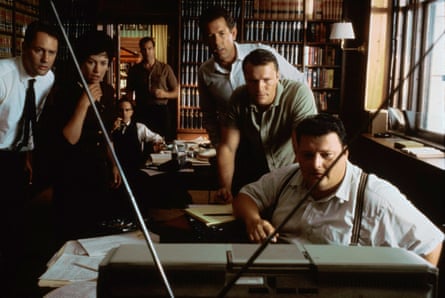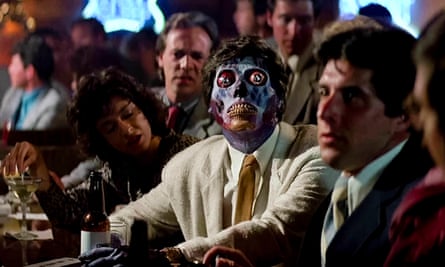Conspiracy thrillers can excel in two ways. Some strike with enough chilling plausibility to change the way you see the world, or at least the powers controlling it, while others delight with the sheer foil-hatted bonkersness of their plotting.
Hypnotic, an elaborately loopy sci-fi conspiracy twister from B-movie stalwart Robert Rodriguez, falls firmly and unapologetically into the latter category. Audiences weren’t persuaded – it tanked in cinemas – but I think it has the makings of classic midnight-marathon fodder. This is, after all, a film about a gruff cop (a remarkably straight-faced Ben Affleck) gradually uncovering, in the course of investigating his daughter’s disappearance, an elite group of hypnotists behind a spate of bank heists and more seismic world events. Things somehow get more absurd from there, in what plays like a delirious fusion of Christopher Nolan and The Twilight Zone.
If anything, Rodriguez’s film is a goofy throwback to the more rigorous stylings of one of the earliest great conspiracy films: in Fritz Lang’s 1922 expressionist masterwork Dr Mabuse, the Gambler (Internet Archive), the eponymous criminal mastermind (with, yes, powers of hypnosis) uses occult forces to control the global stock market. Alfred Hitchcock, of course, successfully steered the conspiracy thriller away from outright fantasy and into taut, it-could-happen-to-you tension – never better than in The 39 Steps (1935), with its spiralling story of an ordinary man wrongly accused of murder and caught up in a global espionage plot.
In the 1960s, the cold war brought with it a new, fretful wave of conspiracy fear-mongering in cinemas, best exemplified by John Frankenheimer’s 1962 icy mind-control thriller The Manchurian Candidate. With its tale of a brainwashed war veteran fronting a plot to overthrow the US government, it encapsulated the era’s anti-communist hysteria with some sly degree of satire. (By the time it was remade, efficiently enough, by Jonathan Demme in 2004, it just didn’t pack the same punch.)

The assassination of John F Kennedy in 1963 fuelled conspiracy theories for decades after, in life and the movies alike. Written by Dalton Trumbo, the 1973 thriller Executive Action luridly proffered the “truth” about the matter, but is little more than a curio now, outclassed in technical brilliance and imaginative theorising by Oliver Stone’s magnificent JFK (1991), a self-styled “counter-myth” to scores of assassination conspiracy theories, pieced together with such immersive, obsessive verve that it’s easy to be seduced by its fictions.
The golden age for the American conspiracy thriller, of course, was the 70s, when Hollywood capitalised on Watergate mania in one shadowy anti-government warning after another. Francis Ford Coppola’s ingenious The Conversation (1974), with Gene Hackman’s audio surveillance expert stumbling upon evidence of a murder, cannily tapped into Nixon-era concerns over privacy and corruption. The same year, in Alan J Pakula’s dark, twitchy The Parallax View, Warren Beatty’s investigative reporter discovered a corporate force behind political assassinations. Journalists were again the heroes in Pakula’s All the President’s Men, which dispensed with resonant metaphors to tackle the Watergate scandal head-on, leaving viewers feeling even warier than before.

Over on the sci-fi side, the prescient eco-parable Soylent Green (1973) – which could have bleakly slotted into our climate crisis films list last week – further seeded distrust in the system with its grisly reveal of a dystopian government harvesting people for people. Peter Hyams’s Capricorn One (1977; free on ITVX), meanwhile, buoyed moon-landing conspiracy theorists with its witty tale of a falsified mission to Mars. Anti-Reaganism in the 1980s inspired John Carpenter’s daffy They Live, in which literal alien forces infiltrate the government; real-life reptilian conspiracy theorists probably take it rather more seriously.

The 90s brought to the genre a fresh, anxious line of internet-era distrust, exploited to now-quaint but still tightly entertaining effect in the Sandra Bullock vehicle The Net. Rising terrorism concerns yielded such films as Mark Pellington’s jittery Arlington Road (Pluto TV), a feverish protest against right-wing militia that, far-fetched as it was, wasn’t entirely off-base in its political prognostications. Beside such films, Hidden Agenda (Apple TV+), Ken Loach’s anti-Thatcher takedown of British security services in Northern Island, played it quiet and sober.
The genre has tailed off a little in the 20th century, perhaps because institutional corruption in many countries has risen so visibly to the surface. With or without hypnotists, it’s due a revival.
All titles are available to rent on multiple platforms unless otherwise specified.
Also new on streaming and DVD
Are You There God? It’s Me, Margaret
(Lionsgate)
It’s remarkable that it’s taken more than half a century for someone to film Judy Blume’s classic, candid children’s novel about a preteen girl reckoning with faith and sexuality. Writer-director Kelly Fremon Craig does so with humour and sensitivity, aided by a beguiling performance from Abby Ryder Fortson. The decision to preserve it as a 1970s period piece is a cautious one, however – why not retool the story for Generation Alpha?

Medusa Deluxe
(Mubi)
Now available to stream after a stint in cinemas, British film-maker Thomas Hardiman’s head-turning debut wraps a slender murder-mystery plot around a big formal gambit: brilliantly shot by Robbie Ryan, it’s cleverly styled as a single take. It’s a stunt, but pulled off with panache; the setting, a national hairdressing competition teeming with catty rivalries, adds salty comedy.
Full Time
(Parkland)
A rare thriller built entirely around everyday circumstances, this heart-in-mouth drama from French director Eric Gravel rests heavily on the shoulders of the marvellous Call My Agent! star Laure Calamy. She inhabits the role of scraping-by single mum Julie – whose already impossible work-life routine is pushed by transport strikes into a race against time – with flinty vulnerability, while the film intelligently and sympathetically outlines a domino system of faulty labour politics.

